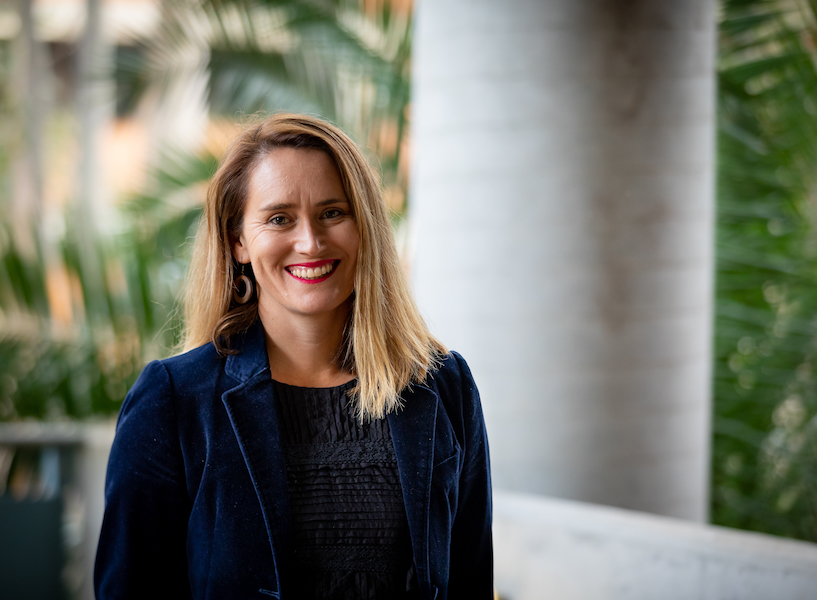Researcher Highlights
Fighting social inequities with research
Kate Davies
Dr Kate Davies is a sociologist with a fierce commitment to social justice. Her work aims to break the cycle of social disadvantage and poorer life and health outcomes by empowering and respecting marginalised voices.

When it comes to social justice, Dr Kate Davies describes herself as “unapologetically idealistic and passionate”.
Her research is helping to improve crucial human services such as housing, employment and child protection by ensuring that the people they serve have power over policy and program decisions. It then seeks to understand what difference this type of citizen involvement might make for people’s health and social outcomes.
“Those people whose lives are changed by the decisions made at policy and program levels must be involved in that decision-making process,” asserts Kate.
“Citizen involvement in human services is a human right and is ethical. But increasingly we are also seeing that where people are involved in the decisions that affect them, the outcomes are better for everyone.”
The true impact of hardship
Kate points to the evidence, which shows again and again, that people who experience complex hardship, such as poverty, violence or living with a disability, tend to have worse outcomes in areas such as health, crime, employment and education.
“The explanation for such unequal outcomes is that discrimination and prejudice is ingrained in the structure of our society. That won’t change unless we understand what is happening and develop evidence on what works to improve equality.”
Kate’s passion for equality permeates every area of her life. She is a respected tertiary educator and researcher, a foster carer, research partner and funder, and a board member for Community Disability Alliance Hunter and Nova for Women and Children. Kate’s research is also purposefully collaborative, inviting input from non-academic partners.
“Working in partnership with people who live the experiences we are studying is important; people aren’t just the subjects of research. However, collaboration takes time; slow relationship building is crucial to effective human services research.”
Kate acknowledges that time can be costly, and research funding difficult to secure. Nevertheless, she rarely lets a lack of funding stand in the way of much-needed progress. With Nova for Women and Children, Kate recently commissioned a piece of local research to be conducted by University of Newcastle researchers on assertive outreach for women. She is also working in collaboration with her law and social work colleagues to explore the importance of parent and family inclusion in child protection practice.
“The evidence tells us that children’s lives are better when they have meaningful connections with their families. I see this in my research work, and I experience it as a foster carer.”
Valuing lived experience
Kate’s research is built on extensive firsthand experience working alongside people during some of the most difficult times of their lives. Over the years, she has worked and volunteered in urban, rural and remote Australian communities and around the world in disaster management, public health and community development.
Kate’s community involvement has given her a deep appreciation for people’s lived experience expertise, which can lead to interventions such as peer support, peer mentoring, advocacy, and community leadership. While there is limited evidence to show whether shifting power to people with lived experience makes a difference to outcomes, Kate is determined to build this evidence base for the future.
“My work in peer support, in particular, has offered clear guidance to community organisations about what it takes to not only employ people with lived experience—for example, lived experience of mental illness—but to ensure that such employment changes organisations for the better.”
Kate has also used her research skills to evaluate and refine mental health and suicide prevention programs, predominantly in rural Australia, creating a cycle of quality improvement. Additionally, her skills as an evaluator and advisor have contributed to several international development programs, particularly within the International Red Cross and Red Crescent Movement.
Creating hope and change
Throughout her vibrant career, Kate has seen “shocking inequalities” but also incredible triumphs. Her work is paving the way to a better future for our communities, one where marginalised voices are respected, valued, and hold power within decisions, policies and programs.
“Once you open your eyes to inequality in the world, it’s impossible to look away.
“I have had the privilege of witnessing community leaders take power, children and young people stand up and advocate for their rights, people living with disability hold their societies to account, women defy oppression and violence, and individuals and families quietly go about their lives with strength and dignity.”
“Through my research and teaching, I hope to make a tiny contribution to the goal of social justice and making the world a more equal place.”
The University of Newcastle acknowledges the traditional custodians of the lands within our footprint areas: Awabakal, Darkinjung, Biripai, Worimi, Wonnarua, and Eora Nations. We also pay respect to the wisdom of our Elders past and present.